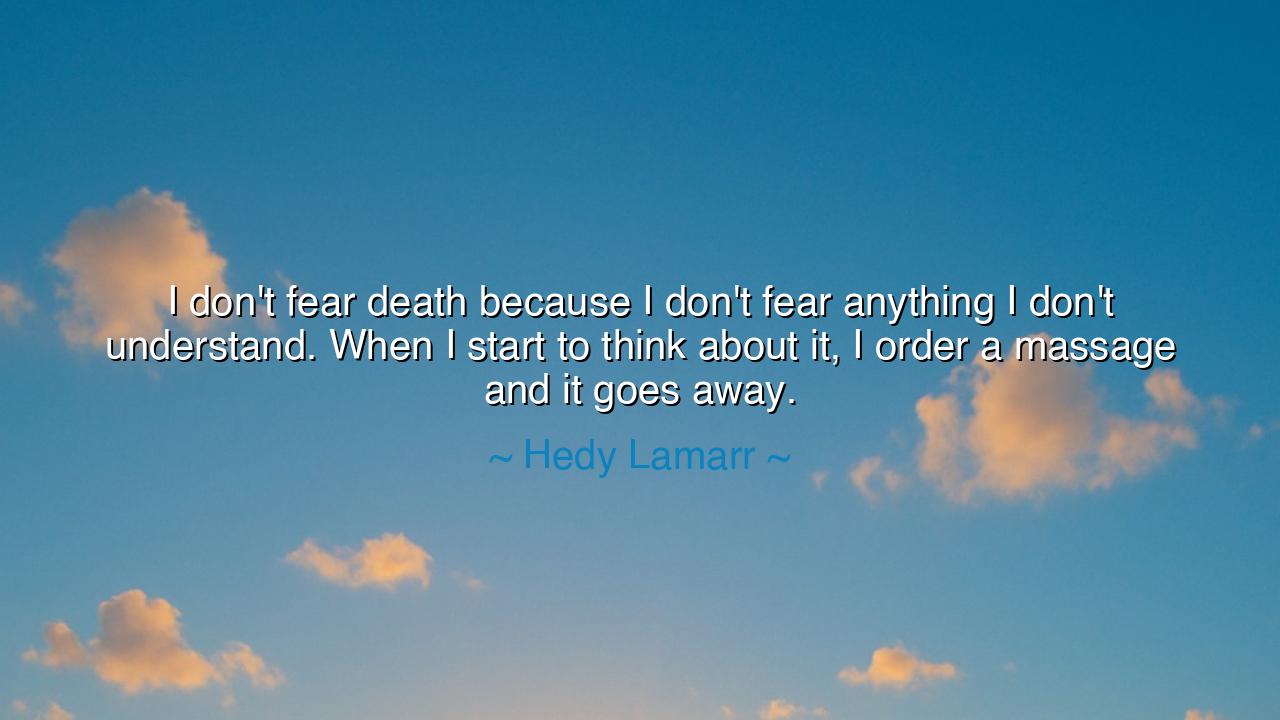
I don't fear death because I don't fear anything I don't
I don't fear death because I don't fear anything I don't understand. When I start to think about it, I order a massage and it goes away.






"I don't fear death because I don't fear anything I don't understand. When I start to think about it, I order a massage and it goes away." — thus spoke Hedy Lamarr, a woman whose beauty dazzled the world, yet whose mind soared far beyond it. Beneath her wit lies a truth both luminous and defiant — that fear is born not from what we face, but from what we fail to understand. In this bold and playful confession, Lamarr reveals the spirit of one who met the great unknown not with trembling, but with curiosity, grace, and humor. Hers was not the denial of mortality, but the mastery of it — the art of meeting life’s deepest mysteries with calm and composure.
The meaning of this quote is layered, like the woman herself. To say “I don’t fear death because I don’t fear anything I don’t understand” is to claim peace in the midst of uncertainty — to accept that there are forces beyond the reach of reason, and to meet them with dignity rather than dread. Lamarr’s words remind us that the unknown is not always a threat; it is a horizon. Death, that final mystery, has frightened humankind since the dawn of time. Yet Lamarr, who lived through war, exile, and fame, learned that fear feeds only on ignorance. When we cease to demand answers from the unknowable, we find a strange serenity. Her humor — ordering a massage to quiet her thoughts — shows that even in the face of eternity, we can choose ease over anguish.
The origin of these words lies in the extraordinary life of Hedy Lamarr, who was far more than a glamorous star of the silver screen. Born in Vienna in 1914, she lived through the upheaval of a world at war, fled the darkness of Nazi Europe, and reinvented herself in America. Yet behind the fame, she was a scientist and inventor, co-creator of the frequency-hopping technology that would one day inspire Wi-Fi and Bluetooth. Her mind was sharp, her will unyielding. Having faced both adoration and isolation, Lamarr came to see that life itself is a dance between knowing and mystery — and she refused to let fear claim her spirit.
Her words bring to mind another who stood before the abyss without trembling: Socrates, who, condemned to death, spoke calmly of the afterlife. He said that death might be one of two things — eternal sleep, or a passage to another world — and that neither was to be feared. For if it was sleep, it brought rest; and if it was awakening, it brought discovery. Like Lamarr, he refused to fear what could not be known. Both souls shared a wisdom rare in any age: that fear fades when one accepts the limits of knowledge. To live well is to stand at the edge of mystery and smile.
Lamarr’s jest about ordering a massage is not mere vanity or frivolity — it is a symbol of how the wise confront anxiety. Rather than surrender to dread, she chooses an act of comfort, of self-care, of returning to the body when the mind becomes lost in speculation. It is a lesson in balance: the heart must not dwell too long in shadows it cannot dispel. The body, the senses, the present — these are gifts meant to anchor us when the vastness of existence threatens to overwhelm. To touch life, even in something as simple as warmth or rest, is to remember that we are still here, still breathing, still human.
In her words, there is also courage disguised as lightness. To laugh at death is to defy it. Throughout history, the great souls — from the Stoic philosophers to the mystics of the East — have known that humor is the armor of the wise. It is not that they mock the grave, but that they see beyond it. They recognize that life’s fleeting beauty gains meaning precisely because it ends. Lamarr’s laughter, then, is a kind of victory — the victory of a spirit that will not be ruled by fear.
The lesson in her words is this: do not fear what you cannot understand, for understanding is not the measure of life — living is. When the mind wanders toward worry, return to the simple, the tangible, the present. Touch the earth, breathe deeply, comfort your soul. Remember that the unknown is not your enemy, but the mirror of your own mystery. For life itself is filled with the incomprehensible — love, beauty, creation — and yet we embrace it without hesitation. Why, then, should death be different?
So, O seeker of wisdom, learn from Hedy Lamarr, who lived fearlessly between glamour and genius. When the thought of death rises, do not fight it with terror, but with serenity. Seek balance, seek laughter, seek peace. Order your “massage” — whatever brings your heart back to calm — and let the shadow pass. For in the end, as she knew, it is not fear that honors life, but acceptance, and the soul that can smile at mystery walks already in light.






AAdministratorAdministrator
Welcome, honored guests. Please leave a comment, we will respond soon